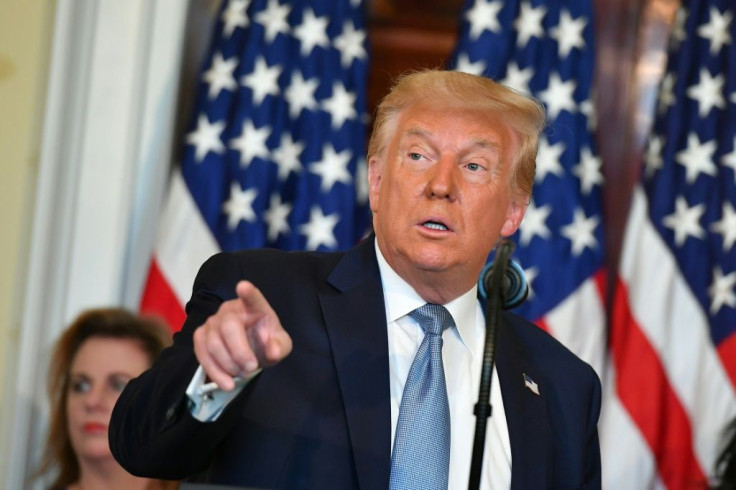Trump Says He 'Canceled' Trade Parley With China, No New Talks Planned

KEY POINTS
- Meadows said no new high-level trade talks with China were currently scheduled.
- Trump again blamed China for spreading COVID-19
- Lighthizer maintains regular contact with his Chinese peers.
President Donald Trump said he was behind the decision to postpone trade talks with China last weekend, raising worries about the future of the trade pact with Beijing.
Senior U.S. and Chinese trade officials – led by Chinese Vice Premier Liu He, U.S. Trade Representative Robert Lighthizer and Treasury Secretary Steven Mnuchin -- were to have held a virtual meeting via video conference to discuss the status of the phase 1 trade deal that was signed in January.
“I canceled talks with China,” Trump said on Tuesday at an event in Yuma, Ariz. “I don’t want to talk to China right now.”
White House Chief of Staff Mark Meadows told reporters on Air Force One on Tuesday that no new high-level trade talks with China were currently scheduled.
But Meadows noted that Lighthizer maintains regular contact with his Chinese peers.
“Ambassador Lighthizer continues to have discussions with his Chinese counterparts involving purchases and fulfilling their agreements,” Meadows said.
Under terms of the phase 1 deal, China was required to upgrade its intellectual property protection protocols, while purchasing more U.S. manufacturing and agricultural goods. In exchange for such concessions, the U.S. would reduce tariffs on various Chinese imports.
While Beijing has made some progress on the IP front, its purchases of U.S. goods has fallen below promised targets, Bloomberg reported.
Relations between the U.S. and China have also been frayed by the ongoing COVID-19 crisis (which Trump blames squarely on China) and the imposition of a controversial security law in Hong Kong (which has led to an exchange of sanctions by the two superpowers).
When asked if he might consider pulling out of the trade deal, Trump replied: “We’ll see what happens.”
“The phase 1 trade deal has been the bright spot in the relationship,” Charles Freeman, senior vice president for Asia at the U.S. Chamber of Commerce, told Bloomberg on Wednesday. “I’m certain the president looks at the election and equity markets and realizes that as challenging as it might be to get the commitments implemented by China that his folks have engineered, it probably would be worse to just scrap the deal entirely.”
Mei Xinyu, a researcher at a think tank under China’s Commerce Ministry, said recent U.S. sanctions on Chinese companies likely impacted the trade talks.
“How can the talks proceed if the U.S. keeps creating new problems?,” Mei said. “Whether the U.S. wants to provide a stable or turbulent environment for businesses, that’s entirely up to them. China should be the anchor of stability and order.”
Terminating the trade deal will require a written notification and then become effective in 60 days, Bloomberg noted.
© Copyright IBTimes 2025. All rights reserved.





















